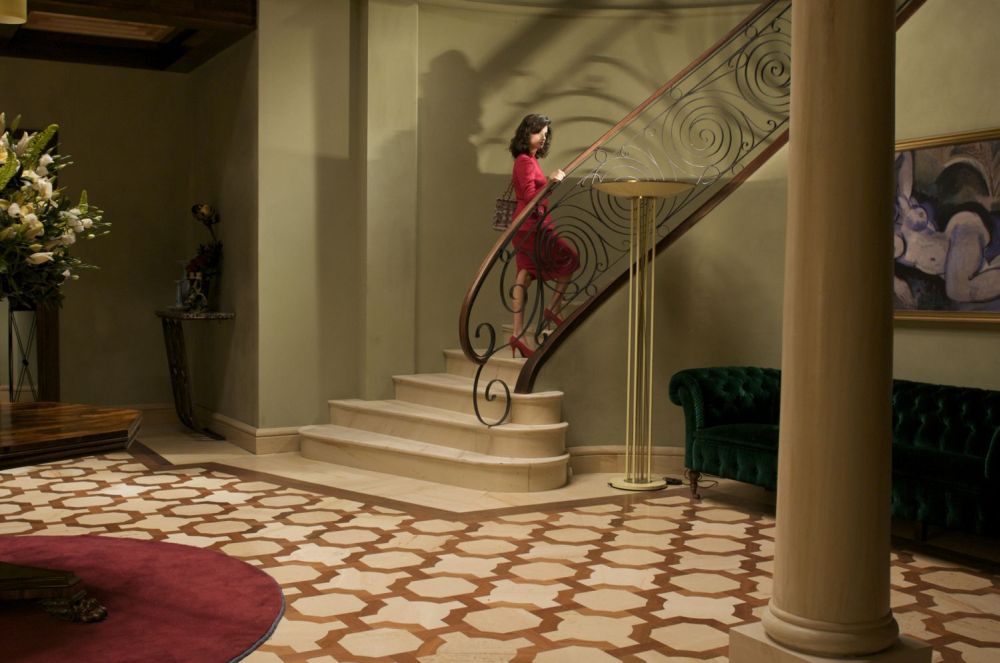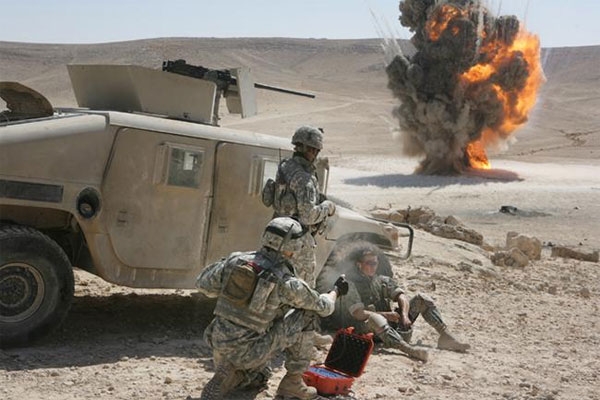September Listings
Bytowne Cinema
Cold Souls (Sophie Barthes, 2009) 4/09 - 10/09.
Key Largo (John Huston, 1948) 8/09 - 9/09.
Rashomon (Akira Kurosawa, 1950) 11/09 - 16/09.
Tetro (Francis Ford Coppola, 2009) 11/09 - 15/09.
Bright Star (Jane Campion, 2009) 25/09 - 08/10.
The Mayfair Theatre
Crimes and Misdemeanors (Woody Allen, 1989) 01/09.
The Killer (John Woo, 1989) 12/09.
The General (Clyde Bruckman & Buster Keaton, 1926) 17/09.
Saturday, August 29, 2009
Friday, August 28, 2009
Notes from the Irritated
Inglourious Basterds (Quentin Tarantino, 2009)
* (Has redeeming facets)

In continental 1940's France, in a small wooden house isolated around a vista of prairies. Perrier LaPadite (Denis Menochet), A cow farmer, is chopping wood as his three daughters are performing household chores. Col. Hans "Jew Hunter" Landa (Christoph Waltz, winner of the Best Actor Prize at Cannes) arrives to the farm, you can see his car slowly creep up in the landscape behind a blowing white sheet. He is there to question Perrier anew on the disappearance of a neighboring jewish family. After a long mundane interrogation, that involved Col. Hans asking for a fresh glass of milk and the smoking of a embarrassing "Sherlock Holmes" pipe he confronts Perrier to acknowledge his cooperation with the Jews. In a lurid close-up of Perrier, thoughts of saving himself and his daughters are put against giving up these inocent refugees that he is protecting. His heroism is broken down and he gives them up. Which leads to the Nazi soldiers coming in and shooting the floorboards where underneath they are hiding. Sawdust and wood fly upwards. They are dead. Except for Shosanna Dreyfus (Mélanie Laurent), one of the girls in hiding. She escapes.
This first chapter out of five is the height of the films examination of history and the actual effect Nazi's had on occupative individuals, families and the European Jewish population. Though the scene, with its landscape shots juxtaposed against close-ups, is a pastiche of both confrontations and the style derived out of spaghetti westerns. Also following in the next chapter with the introduction of the Inglorious Basterds (a misspelled appropriation of Enzo G. Castellari's The Inglorious Bastards). Lt. Aldo Raine (Brad Pitt) and his archaic Jewish-American militants murder, remove scalp's and carve swastikas on foreheads of Nazi's. By paying homage to the western's sordid violence against obvious historical "bad guys" it is assuming that what is going on should be admired or enjoyed. When in reality the film is turning the American soldiers into Nazis. Their morally ignoble violence reaches a climax, paralleling the story's climax, as two soldiers shoot down a film theater full of Germans simultaneously while the building is burning down.
The scenes between Shosanna and Pvt Fredrick Zoller (Daniel Brühl) are in this little French film, the Brit's sending the film critic Lt. Archie Hicox (Michael Fassbender) is from a bunch-of-guys-go-to-war movie, the scenes with Gobbels and Hitler are shot like a glorying-war-hero film, and the relationship between Shosanna and Marcel (Jacky Ido) is a derivative of the race-issue-subverted-as-melodrama pictures. This mishmash of genre tenets do come together coherently and the effect on the viewer is somewhere between boredom and who-cares. The references to G.W.Pabst or Leni Riefenstahl do not elevate the film either.
Redeeming facets include the films use of multiple languages and dialects. Especially in a foreign context (I saw the film in Berlin), it had a tremendous effect. When the actor spoke either German or Italian (except for Lt. Aldo Raine and his minions) this viewer had very little, or no, idea what was being said, emphasizing a un-American context and the films international market. As well the splendid montage of Shosanna getting all dressed up for the film premiere of Nation's Pride.
Any film that decides to dramatize the second world war has a very complex task in front of it. The further in history we are from the actual events the more important it becomes to remember them with accuracy. With more and more films coming out on the subject, the second world war is now being partly remembered more in terms of film genres. Disrespectable poetic licensing is being used all over cinema; by art-house films (Korczak), action pictures (Valkyrie), and especially Inglorious Basterds with its naive wish-fulfilling fictional dramatization. No matter how much Quentin Tarantino would wish cinema, the flammable 35mm prints of films or the concept, could of ended the war and saved millions of jews, It didn't. The closer we get to fiction, the further we are removed from fact.-David Davidson
(Hackesche Höfe, Berlin, Germany)
* (Has redeeming facets)

In continental 1940's France, in a small wooden house isolated around a vista of prairies. Perrier LaPadite (Denis Menochet), A cow farmer, is chopping wood as his three daughters are performing household chores. Col. Hans "Jew Hunter" Landa (Christoph Waltz, winner of the Best Actor Prize at Cannes) arrives to the farm, you can see his car slowly creep up in the landscape behind a blowing white sheet. He is there to question Perrier anew on the disappearance of a neighboring jewish family. After a long mundane interrogation, that involved Col. Hans asking for a fresh glass of milk and the smoking of a embarrassing "Sherlock Holmes" pipe he confronts Perrier to acknowledge his cooperation with the Jews. In a lurid close-up of Perrier, thoughts of saving himself and his daughters are put against giving up these inocent refugees that he is protecting. His heroism is broken down and he gives them up. Which leads to the Nazi soldiers coming in and shooting the floorboards where underneath they are hiding. Sawdust and wood fly upwards. They are dead. Except for Shosanna Dreyfus (Mélanie Laurent), one of the girls in hiding. She escapes.
This first chapter out of five is the height of the films examination of history and the actual effect Nazi's had on occupative individuals, families and the European Jewish population. Though the scene, with its landscape shots juxtaposed against close-ups, is a pastiche of both confrontations and the style derived out of spaghetti westerns. Also following in the next chapter with the introduction of the Inglorious Basterds (a misspelled appropriation of Enzo G. Castellari's The Inglorious Bastards). Lt. Aldo Raine (Brad Pitt) and his archaic Jewish-American militants murder, remove scalp's and carve swastikas on foreheads of Nazi's. By paying homage to the western's sordid violence against obvious historical "bad guys" it is assuming that what is going on should be admired or enjoyed. When in reality the film is turning the American soldiers into Nazis. Their morally ignoble violence reaches a climax, paralleling the story's climax, as two soldiers shoot down a film theater full of Germans simultaneously while the building is burning down.
The scenes between Shosanna and Pvt Fredrick Zoller (Daniel Brühl) are in this little French film, the Brit's sending the film critic Lt. Archie Hicox (Michael Fassbender) is from a bunch-of-guys-go-to-war movie, the scenes with Gobbels and Hitler are shot like a glorying-war-hero film, and the relationship between Shosanna and Marcel (Jacky Ido) is a derivative of the race-issue-subverted-as-melodrama pictures. This mishmash of genre tenets do come together coherently and the effect on the viewer is somewhere between boredom and who-cares. The references to G.W.Pabst or Leni Riefenstahl do not elevate the film either.
Redeeming facets include the films use of multiple languages and dialects. Especially in a foreign context (I saw the film in Berlin), it had a tremendous effect. When the actor spoke either German or Italian (except for Lt. Aldo Raine and his minions) this viewer had very little, or no, idea what was being said, emphasizing a un-American context and the films international market. As well the splendid montage of Shosanna getting all dressed up for the film premiere of Nation's Pride.
Any film that decides to dramatize the second world war has a very complex task in front of it. The further in history we are from the actual events the more important it becomes to remember them with accuracy. With more and more films coming out on the subject, the second world war is now being partly remembered more in terms of film genres. Disrespectable poetic licensing is being used all over cinema; by art-house films (Korczak), action pictures (Valkyrie), and especially Inglorious Basterds with its naive wish-fulfilling fictional dramatization. No matter how much Quentin Tarantino would wish cinema, the flammable 35mm prints of films or the concept, could of ended the war and saved millions of jews, It didn't. The closer we get to fiction, the further we are removed from fact.-David Davidson
(Hackesche Höfe, Berlin, Germany)
Tuesday, August 25, 2009
Saturday, August 22, 2009
Sunday, August 16, 2009
Diverse 1960s French Filmmaking
Paris vu par... (Claude Chabrol, Jean Douchet, J-L Godard, J-D Pollet, Eric Rohmer & Jean Rouch, 1965)
*** (A Must-See)

(Arsenal, Posdamer Platz, Berlin, Germany)
*** (A Must-See)

(Arsenal, Posdamer Platz, Berlin, Germany)
Labels:
Arsenal,
Berlin,
Claude Chabrol,
Eric Rohmer,
J-D Pollet,
J-L Godard,
Jean Douchet,
Jean Rouch,
Paris vu par...
Saturday, August 15, 2009
Comprehensible-Linguistically Impenetrable-Sexy Melodrama
Los Abrazos Rotos (Pedro Almodóvar, 2009)
** (Worth Seeing)

(Cinestar Sony Center, Posdamer Platz, Berlin, Germany)
** (Worth Seeing)

(Cinestar Sony Center, Posdamer Platz, Berlin, Germany)
Wednesday, August 12, 2009
Grandfather of American Independent Cinema
Love Streams (John Cassavetes, 1984)
**** (Masterpiece)

Big Trouble (John Cassavetes, 1986)
* (Has redeeming facets)

(Cinema du Parc, 3575 Parc Avenue, Montreal, PQ)
**** (Masterpiece)

Big Trouble (John Cassavetes, 1986)
* (Has redeeming facets)

(Cinema du Parc, 3575 Parc Avenue, Montreal, PQ)
Labels:
Big Trouble,
Cinéma du Parc,
John Cassavetes,
Love Streams,
Montreal
Tuesday, August 4, 2009
American-Iraqi Action War Film
The Hurt Locker (Kathryn Bigelow, 2008)
****(Masterpiece)

(World Exchange Plaza, Empire 7 Cinema, 111 Albert Street)
****(Masterpiece)

(World Exchange Plaza, Empire 7 Cinema, 111 Albert Street)
Labels:
Empire 7 Cinema,
Kathryn Bigelow,
Ottawa,
The Hurt Locker
Subscribe to:
Comments (Atom)

